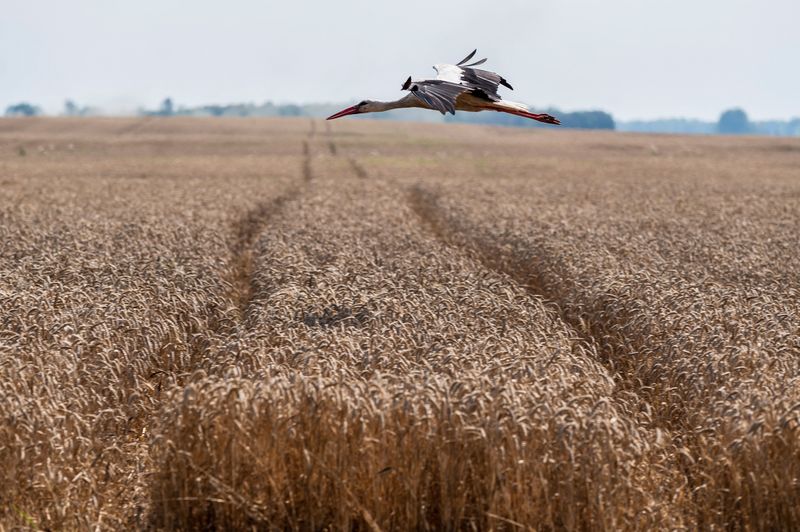LONDON (Reuters) - The first ship carrying Ukrainian grain through the Black Sea since Russia invaded Ukraine more than five months ago left Odesa on Monday under a safe passage agreement that has raised hopes hundreds of other vessels will follow.
But there are many hurdles to overcome before millions of tonnes of Ukrainian grain depart from its Black Sea ports, which handle most of the corn, wheat, barley, sunflowerseed and rapeseed exports of one of the world's top grain suppliers.
Here are some of the issues:
WHAT ABOUT THE SEA MINES?
Russia and Ukraine accuse each other of planting the many naval mines that now float around the Black Sea. These pose a significant threat and were cited by one crew member on the first ship, the Sierra Leone-flagged Razoni, on Monday as the one thing he feared.
The mines have drifted far from Ukraine's shores, with Romanian, Bulgarian and Turkish military diving teams defusing those that have ended up in their waters.
It could take months to clear them and there was not enough time to do so before the grains pact came into effect.
WHAT ABOUT INSURANCE?
In a key step following the July 22 agreement, Lloyd's of London insurer Ascot and broker Marsh on Friday launched marine cargo and war insurance for grain and food products moving out of Ukrainian Black Sea ports.
Insurers had previously said they were only willing to provide cover if there were arrangements for international navy escorts and a clear strategy to deal with sea mines.
The cost of insurance, however, is likely to remain steep.
WHAT ABOUT CREWS?
Finding enough seafarers willing to sail ships stuck inside Ukraine's ports is set to pose another challenge.
At the start of the conflict there were around 2,000 seafarers from all over the world stranded in Ukrainian ports.
Only around 450 are left and few are expected to be willing to travel until they see the safe passage of the first ships which will have to be guided around the sea mines.
HOW WILL EMPTY SHIPS APPROACH?
The deal envisages grain exports from three Ukrainian ports - Odesa, Chornomorsk and Pivdennyi - with shipments to be overseen by a joint coordination centre in Istanbul.
The first step is to start moving around 80 ships which have been trapped in Ukraine since the conflict began, some of which had already been loaded with grain.
The second, and more challenging part of the equation, will involve creating a framework in which ship owners and insurers are willing to allow vessels to enter the conflict zone safely to pick up cargoes without the risk of attack or collision with mines floating around the Black Sea.
WHAT'S AT STAKE?
U.N. Secretary-General Antonio Guterres said the deal would bring relief to developing countries "on the edge of bankruptcy and the most vulnerable people on the edge of famine".
Ukraine's customers include some of the world's poorest countries such as Eritrea in Africa. Ukrainian grain is also supplied into the United Nations World Food Program.
The country can only move around two million tonnes of grain a month by via truck and rail, around half the four million tonnes it shipped through its sea ports before the conflict.
The sharp decline in shipments from Ukraine played a role in driving up global food prices at a time when world hunger is on the rise. The COVID-19 pandemic and climate shocks have also contributed to food price inflation.
HOW MIGHT THE DEAL SLOW GLOBAL FOOD INFLATION?
Russia's invasion of Ukraine has spurred food price inflation by driving up prices of both grains and energy. Russia has slowed its natural gas exports to Europe, blaming Western sanctions on pipeline equipment. Western leaders have accused Moscow of blackmail. More expensive fuel drives up the cost of farming, transporting, processing and packaging food.

If the grain export plan succeeds, a decline in global prices of grains and oilseeds is widely anticipated. Supplies are still tight, though, and Ukraine's harvest this year will be lower than last because the conflict has disrupted farming.
The World Food Programme has warned food prices will remain elevated even if the deal holds.